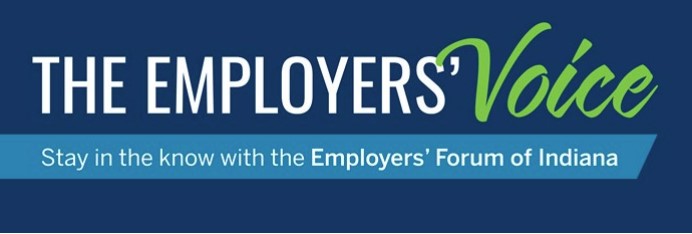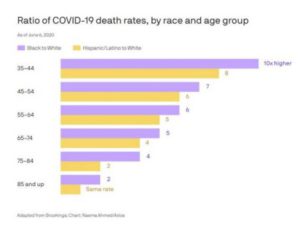
Dear Colleagues,
The COVID-19 pandemic and the tragic deaths of Mr. George Floyd and Ms. Breonna Taylor, among others, have made evident two pervasive faults in our society: poor public health infrastructure and the injustice racism imparts within the criminal justice system.
Upon reviewing U.S. COVID-19 deaths by race (see below), we observe the devastating effect of inherent racial biases within our healthcare system. It is the ugly truth that we must face.

Each of us is in a position to be part of the solution. I challenge you to consider what you will do, no matter how small of a step it may be, to address these issues. Please send me your ideas, policies, and training materials, as the Forum is committed to sharing information across stakeholders. You may wish to read the following articles, and if interested, donate to a local organization focused on achieving civil and social equity. Thank you for your partnership and leadership.
Gloria Sachdev
President and CEO, Employers’ Forum of Indiana
Show Your Support to Local Organizations
Local Organizations focused on Achieving Civil and Social Equit
Coronavirus COVID-19 Resources
Employer Re-Open Resources (Employers’ Forum of Indiana)
Re-opening resources for employers compiled by EFI. Topics include employer-specific re-opening guidelines, state, national, and federal re-opening guidelines, antibody testing, contact tracing, masks, predictive tools, insurance coverage, and more.
Challenges of “Return to Work” in an Ongoing Pandemic (The New England Journal of Medicine)
This article seeks to identify the major public health challenges faced by private entities in resuming on-site operations, and explores ways in which this might be done most effectively, consistent with applicable regulations. For additional resources, review our compilation of Employer Re-Open Resources.
Axios Vitals (Axios)
Top coronavirus COVID-19 news in 10 minutes or less. Subscribe to keep up with health care politics, policy and business, by health care reporter Caitlin Owens.
COVID Stimulus Watch (A public service of Good Jobs First)
COVID Stimulus Watch assembles CARES Act recipient data and combines it with information about each firm’s history of regulatory violations, previous government assistance, federal tax avoidance, and CEO and worker pay practices.
The Health and Economic Impacts of COVID-19 Interventions (RAND)
Facing the rapid spread of the COVID-19 pandemic, state and local leaders have taken unprecedented measures to protect their communities. These interventions are having wide-ranging effects on the health, economy, and social well-being of populations. Use this tool to help plan a recovery roadmap by estimating the effects of non-pharmaceutical interventions on health and economic outcomes.
Amid the Coronavirus Crisis, a Regimen for Reentry (The New Yorker)
Health-care workers have been on the job throughout the pandemic. What can they teach us about the safest way to lift a lockdown?
Debunking Myths in the Surprise Billing Debate (Arnold Ventures)
The COVID-19 pandemic has underscored the health care affordability crisis facing many Americans and the need for surprise billing protections. Congress already has developed effective bipartisan compromise solutions that could be enacted now.
The Crisis of COVID-19 Heightens the Need for Surprise Billing Protections (The Source on Healthcare Price & Competition)
Earlier this year, the federal government appeared poised to address the problem of surprise billing, but the coronavirus pandemic shifted policy priorities before Congress had a chance to act. While some lawmakers may try to include surprise billing protections in the next COVID-19 stimulus package, the pandemic and its ripple effects make action by lawmakers to address surprise billing critical.
National Conference Rescheduled for September 18, 2020
2nd Annual Hospital Price Transparency Conference: Path to Affordability
We are excited to announce that our national conference has been rescheduled for September 18, Join us for this one-day event to hear the results of round three of the National Hospital Price Transparency study (“RAND 3.0”), learn about the variability of value among hospital systems, participate in interactive panel discussions, and network with industry colleagues.
Thanks to a generous grant from the National Institute for Healthcare Reform, Forum members have the opportunity to attend this conference at no charge. For non-members, there will be a small registration fee to cover costs.
Legislative Updates
Database of State Laws Impacting Healthcare Cost & Quality
Presented by The Source on Healthcare Price and Competition, in collaboration with Catalyst for Payment Reform. Viewers can freely access this data base to search inactive, in progress and enacted legislation regarding anticompetitive contract language. This database can be filtered by key issues, jurisdiction, status of bills, and statutes in the U.S.
2020 Indiana Legislative Session – Healthcare Issue Summary Document
The 2020 Indiana Legislative session brought many healthcare issues to light, addressing topics from smoking age to surprise billing. In an effort to keep you updated, we created a legislative summary document which you can access here.
Member Spotlight
Meet Dr. Lakshmi Aggarwal

Job Title: MD, Physician Lead for OCM and Value-Based Care
Organization: Fort Wayne Medical Oncology and Hematology
Years as an Employers’ Forum Member: Two
How has your membership at the Forum impacted you?
I was originally invited to the Forum as a guest, I heard about the RAND 1.0 study presentation…it was certainly an eye opener, and sparked my interest in wanting to learn more about our healthcare system in general. I have to admit, I had very little knowledge about the workings of different components of the healthcare system beyond my capacity as a practicing oncologist. Once I started attending forum meetings, I realized that I was swimming with the right fish but was in the wrong pond. Last 2 years of attending forum meetings has provided a steep learning curve. I am impressed by the depth of knowledge of most of the attending members and their generosity in freely sharing their knowledge. (I did run into several Glorias who are a force of nature).
What, if anything, sparked your passion for healthcare?
There are three separate events which occurred at about the same time: my group of 16 oncologists volunteered to participate in CMS-OCM project which is a value based care model, I was invited to join community oncology Alliance as a board member, and we joined the Employers’ Forum. Between all these three different associations, I got to see a 30,000 foot overview of the healthcare ecosystem with its different components with competing agendas and priorities. I think all parts of the system know the same alphabet but speak a different language. Terms such as hospital charge master, 340 b pricing, balance billing, DIR fees, spread pricing, drug rebates, co-pay, deductible, Medicare part B/part D, donut hole, antikickback statute are now familiar terms. I am now all in trying to comprehend this system with all its complexity, some of which is clearly by design to make the system opaque. I believe for the patients’ sake, doctors need to understand the complex system they expect patients to navigate. The price of everything we do is now relevant. In these incredible times where immunotherapy and CAR-T hold the promise of revolutionizing oncology- these are indeed “the best of times, the worst of times”.
What is your favorite and least favorite food?
My favorite food is a whole category—dessert. Least favorite—meat (I am vegetarian).
Special Thank You

Big thank you to Dr. Malaz Boustani for presenting on Delirium and its impact on brain health. A recent New York Times article captures the symptoms of Delirium during and post hospitalization. We encourage you to read through the articles and familiarize yourself with Delirium prevention.
Watch Dr. Malaz Boustani’s Presentation – Delirium Impact on Brain Health
Resources from Dr. Boustani’s Presentation:
In the News
Employers
Physician Prices And The Cost And Quality Of Care For Commercially Insured Patients (Health Affairs)
An analysis of the relationship between prices paid to 30,549 general internal medicine physicians and the cost and quality of care for 769,281 commercially insured adults.
Healthcare Industry
A Real Market in Medical Care? Singapore Shows the Way (Wall Street Journal)
If the U.S. wants lower costs, better outcomes, faster innovation and universal access, it should look to the country that has the closest thing to a functioning health-care market: Singapore.
Make Transparent Health Care Prices A Price Of Any Future Aid To The Health Care Industry (Health Affairs)
It’s time for Congress to stop focusing its efforts on supporting the wealthy health care and health insurance industries and it’s time for these industries to help American families and businesses and drop their fight against health care price transparency. This starts by equipping Americans—both families and employers—with tools to be better purchasers of health care.
Wide State-Level Variation In Commercial Health Care Prices Suggests Uneven Impact Of Price Regulation (Health Affairs)
Prices charged for health care services in the commercial insurance market are high and vary widely within and between market areas. Indiana is ranked #3 for inpatient and #2 for outpatient out of 48 regarding high hospital prices.
Hospitals
Study: Medicare spent $2.6 billion in 2018 on undelivered post-op visits (Modern Healthcare)
A new CMS-funded study suggests surgeons are overpaid for certain bundled procedures and proposes a solution it says could save the agency billions of dollars annually.
How Rich Investors, Not Doctors, Profit From Marking Up ER Bills (ProPublica)
TeamHealth, a medical staffing firm owned by private-equity giant Blackstone, charges multiples more than the cost of ER care. All the money left over after covering costs goes to the company, not the doctors who treated the patients.
Do you have a suggestion or contribution for our next newsletter? Contact us.

